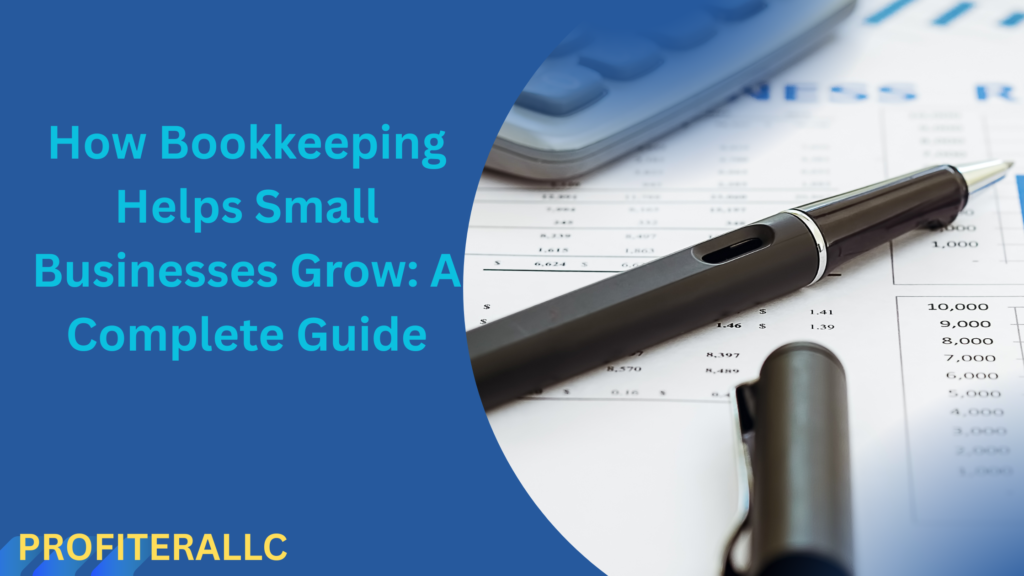
Introduction
Running a small business is a dream for many—but the road to sustainable growth is filled with challenges. Among the countless responsibilities, bookkeeping often gets overlooked. However, accurate and consistent bookkeeping is one of the most powerful tools a small business can use to grow and succeed.
In this comprehensive guide, we’ll explore how bookkeeping helps small businesses grow, from maintaining cash flow and securing funding to enabling better financial decisions and compliance. Whether you’re a freelancer, a startup founder, or a small business owner, understanding the role of bookkeeping in growth can give you a competitive edge.
Table of Contents
- What Is Bookkeeping?
- The Link Between Bookkeeping and Business Growth
- Cash Flow Management
- Informed Business Decisions
- Budgeting and Forecasting
- Easier Tax Preparation and Compliance
- Better Client and Vendor Relationships
- Access to Business Funding
- Cost Control and Profitability Tracking
- Scalability and Long-Term Planning
- Common Bookkeeping Mistakes to Avoid
- Hiring a Professional vs DIY Bookkeeping
- Choosing the Right Bookkeeping Tools
- Final Thoughts
1. What Is Bookkeeping?
Bookkeeping is the process of recording, categorizing, and organizing all financial transactions of a business. These transactions include sales, expenses, payroll, tax payments, and more.
Key bookkeeping tasks:
- Recording daily transactions
- Managing invoices and receipts
- Tracking accounts payable and receivable
- Reconciling bank statements
- Generating financial reports
It forms the foundation of a strong financial system.
2. The Link Between Bookkeeping and Business Growth
Bookkeeping is more than just compliance—it’s about control, clarity, and confidence in your business. Accurate bookkeeping:
- Highlights financial strengths and weaknesses
- Prevents cash flow shortages
- Helps plan for the future
- Builds trust with investors and lenders
Let’s break down the specific ways bookkeeping supports small business growth.
3. Cash Flow Management
Cash flow is the lifeblood of any business. Without proper bookkeeping, it’s nearly impossible to track where your money is going—or why you’re running out of it.
How bookkeeping helps:
- Tracks income vs expenses
- Identifies unpaid invoices
- Monitors recurring payments
- Alerts you to cash gaps in advance
With up-to-date books, you can ensure your business never runs dry, even in slow seasons.
4. Informed Business Decisions
Guesswork is dangerous in business. Whether it’s expanding to a new market or hiring a team member, data-driven decisions are key.
With regular bookkeeping:
- You know which products/services are profitable
- You understand customer spending trends
- You see which areas are draining your budget
All this leads to smarter, faster, and more strategic growth decisions.
5. Budgeting and Forecasting
You can’t grow without a plan—and planning depends on accurate numbers.
Bookkeeping provides the data you need to:
- Create realistic monthly and annual budgets
- Forecast future sales and expenses
- Adjust strategies based on performance
This keeps your business on track toward its growth goals.
6. Easier Tax Preparation and Compliance
Many small businesses face penalties simply because they can’t keep up with tax rules. Proper bookkeeping simplifies tax filing and compliance.
Benefits:
- Categorizes tax-deductible expenses
- Keeps clean records for audits
- Reduces last-minute tax stress
- Ensures accurate GST/VAT returns
This saves money and helps avoid costly legal trouble.
7. Better Client and Vendor Relationships
Bookkeeping ensures that:
- Clients are billed correctly and on time
- Vendors are paid promptly
- Disputes over payments are resolved quickly
Why it matters:
Strong relationships lead to better terms, repeat business, and referrals—important factors in sustainable growth.
8. Access to Business Funding
Lenders and investors need to see clear financial records before giving you money. Without proper bookkeeping, you could miss out on critical funding opportunities.
Organized books allow you to:
- Apply for loans and grants with confidence
- Present accurate balance sheets and income statements
- Build trust with banks and VCs
Good financials tell a story of professionalism and potential.
9. Cost Control and Profitability Tracking
Growing a business isn’t just about revenue—it’s about managing costs and maximizing profits.
Bookkeeping helps you:
- Track operating expenses in real-time
- Identify wasteful spending
- Monitor profit margins by product/service
This leads to better pricing strategies and higher profits over time.
10. Scalability and Long-Term Planning
As your business grows, things get more complex. Without bookkeeping, you can’t scale effectively.
With solid records:
- You can systematize operations
- Onboard employees smoothly
- Maintain financial stability across multiple projects
Bookkeeping supports a growth mindset by laying a strong financial foundation.
11. Common Bookkeeping Mistakes to Avoid
Small businesses often make these avoidable errors:
- Mixing personal and business finances
- Ignoring accounts receivable
- Forgetting to reconcile bank statements
- Not backing up records
- Waiting until tax season to organize finances
Avoiding these mistakes can save your business thousands.
12. Hiring a Professional vs DIY Bookkeeping
DIY Bookkeeping:
- Suitable for early-stage businesses
- Requires software (e.g., QuickBooks, Zoho Books)
- Time-consuming and risky without experience
Hiring a Professional Bookkeeper:
- Saves time and reduces errors
- Offers expert insights and advice
- Ensures compliance and audit readiness
Outsourcing is a growth strategy—you get more time to focus on what you do best.
13. Choosing the Right Bookkeeping Tools
Today’s digital tools make bookkeeping faster and easier than ever.
Top options:
- QuickBooks: Great for small and mid-sized businesses
- Xero: User-friendly with powerful integrations
- Zoho Books: Affordable and scalable
- Wave Accounting: Ideal for freelancers and solo entrepreneurs
Look for software that offers automation, reporting, cloud access, and integrations with your other business tools.
14. Final Thoughts
If you’re serious about growing your small business, you can’t afford to ignore bookkeeping. It gives you the financial clarity and control needed to make smarter decisions, manage resources, and plan for the future.
Bookkeeping supports growth by:
- Improving cash flow
- Enabling strategic planning
- Boosting investor confidence
- Ensuring legal compliance
- Increasing profitability
Whether you manage it yourself or hire a professional, make bookkeeping a priority—and watch your business grow.






